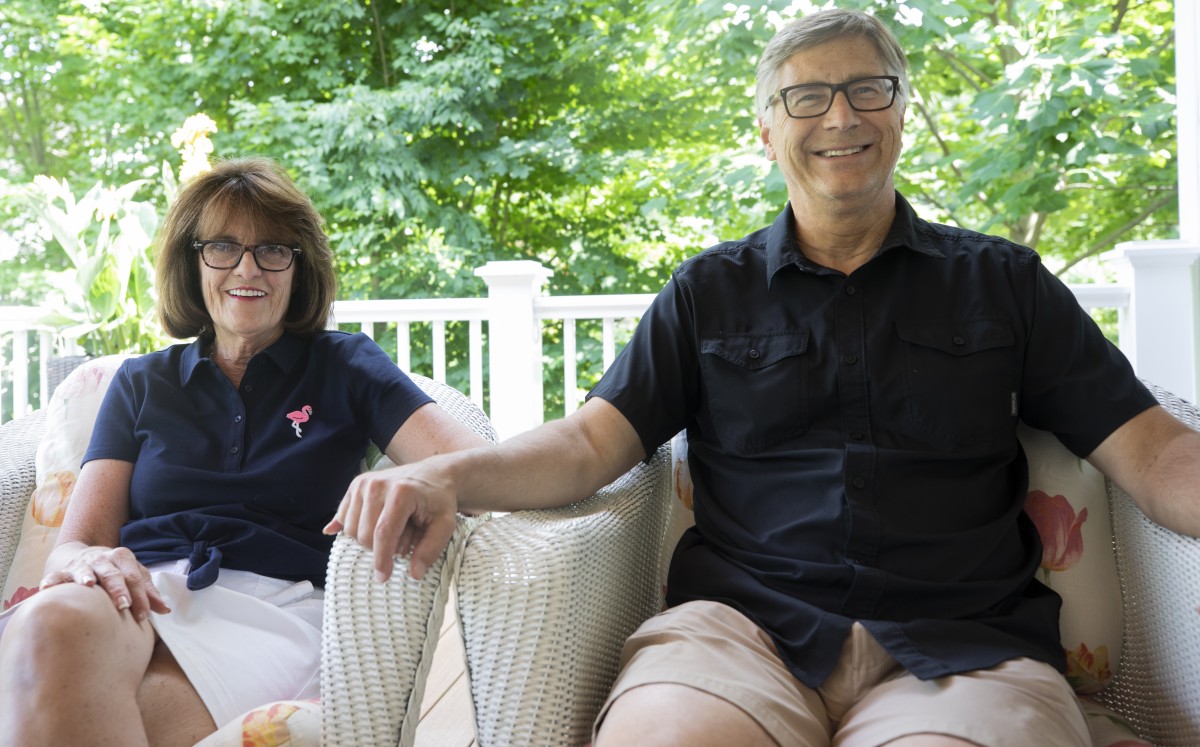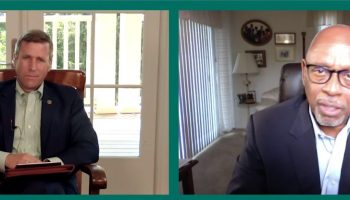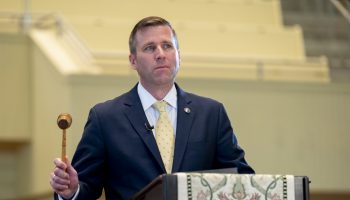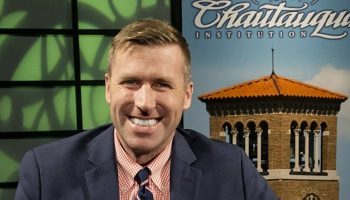If the Chautauqua Institution Board of Trustees and President Michael E. Hill were looking for the perfect candidate to strengthen relations between the Institution and the surrounding community, they may have hit the jackpot with Mike Metzger, one of two new trustees who joined the board at the end of last year. With an impressive resume in business and finance and a lengthy list of local boards and affiliations, Metzger is able to bring a lot of local relevance to the board table. Metzger and his wife Marge shared thoughts with the Daily on his lifelong career in western New York state and living year-round on the Institution grounds.We spoke on the shady rear deck of their Highlands home overlooking a grove of fruit trees the local residents call the orchard.
How did you come to Chautauqua?
Mike: I’m going to pass this to Marge because my affiliation with Chautauqua is through my wife.
Marge: We came here together in 1983. Mike was working for Bausch + Lomb, and we faced a choice. We could move to California or Austin, Texas, or to this area. My family was from Jamestown, and we decided to move here. An appointment we initially thought of as temporary turned into one that enabled us to raise our family in Bemus Point.
Mike: Tell them about Chautauqua proper. You attended and taught in the local schools.
Marge: I’m a retired schoolteacher from Chautauqua Lake Central School. When we moved here in 1981, I got a part-time position at the old high school across Route 394 teaching students who were deaf and hearing-impaired. I got a full-time job in 1985.
It’s funny how life turns full circle at times. I started out in school at the elementary school at the Turner School, and now Mike and I ride our bicycles over there for exercise and fellowship, especially in the off-season. I can look up and see my old classroom. It’s a development I didn’t expect, but there’s a comfort in it.
When I was teaching, we had a grant enabling us to study one square kilometer of the earth. We chose part of the Institution grounds. We’d bring our students down here in the spring. And our own daughters would come over from Bemus for the Special Studies programs in the summer. They remember their pottery classes, calligraphy and others. They were friends with Winnie Lewellen’s granddaughters. Winnie of course was the manager of (then) Wensley House, and one of those granddaughters is Journey Gunderson, the current leader of the new National Comedy Center in Jamestown set to open Aug. 1.
So our daughters married and had kids — our daughter in Cleveland has 8-year-old triplet boys — and we were in Bemus Point, and I thought that the Institution would be such a great place to welcome grandchildren to our home. That was probably the major reason we moved here.
Mike: Our Cleveland daughter and her husband are physicians at the Cleveland Clinic. Our younger daughter works for Harley-Davidson in Milwaukee, and her husband works (for) the Brewers baseball team. They have a boy and a girl, so we finally got a granddaughter. The grandkids have visited us here this summer.
Where did you grow up, Mike?
Mike: I grew up in the Rochester area, and Marge and I met as students at St. Bonaventure University, which has become somewhat more prominent around these parts in the past couple of years. I graduated 20 years before Michael Hill. Marge and I were married in the chapel at Bonaventure. Later, I got my MBA at Rochester Institute of Technology.
Marge: The kids tease us about this. We met in September of our senior year and got married the next April. It was a bit of a whirlwind romance, I guess. We never had an occasion to come to Chautauqua while we were dating, though.
Mike: So after my MBA, I joined Bausch + Lomb in Rochester, working on selling off their instrument divisions. They decided they didn’t want to be in scientific instruments any more. They wanted to concentrate on soft contact lenses. There was a company in this area by the name of Microline that Bausch + Lomb had purchased. I came down here with a team of four. Our job was to make sure this Microline division was truly separate from Bausch + Lomb so that it could be sold. When the sale went through, I went with the purchasers, a company called Acu-Rite, in 1985. Acu-Rite was owned by a German company called Dr. Johannes Heidenhain GmbH. That company still has a small operation in the Jamestown area.
In 2010, I left that company and took a job with Blackstone Business Enterprises, with the intent of selling that company. And I did that. After staying on there after the sale for a few years, Marge helped to find another job for me. I am currently the vice president of finance and administration at SUNY Fredonia.
You two are really true-blue locals.
Marge: I would say so, yes. Mike has been involved in so many things here. When we first moved here, he ran for the school board and won as a write-in candidate in Bemus Point. That really started him in his leadership positions in the area. Since then, he’s been on almost every board that I can think of in Chautauqua County.
Mike: I was the president of the United Way, and the campaign chairman one year; president of the Chautauqua Region Community Foundation; president of the Red Cross board; president of the Resource Center. I’m presently the chairman of the county Industrial Development Agency, and I’m on the Western New York Regional Development Council.
I must say that Gov. Cuomo has put a lot of money into the region through public-private partnerships and other initiatives. Without those efforts, there would be no Comedy Center. Jamestown has gotten $10 million for economic development. There are opportunities here.
But looking back on all my civic involvement, I was also very fortunate in that I had a very supportive wife who allowed me to sometimes come home later in the evening after board meetings that were held after work. In a community like this, you’re not just on some board. You are part of a community. You are passing out fliers. You’re very participatory. It’s not like in a larger city, where the board members may just kind of sit on a board, removed from the street, if you will.
Mike, you seem like an optimistic man. But take a hard look for a moment. What’s going to save this county?
Mike: Tourism. Being from a manufacturing background, I hate to say that. But it’s true. The manufacturing base is in decline. We need to build our industrial base, especially through the IDA, but it’s difficult and it’s definitely long-term.
The county executive has said the top tourism centers in the county are the Institution and Chautauqua Lake. Do you agree?
Mike: No question about it. And tourism is seasonal: late spring, summer, early fall mostly. The Institution and the county are trying to expand more into the shoulder seasons before and after the Chautauqua summer season.
How are your kids and grandkids bonding with the Chautauqua experience?
Mike: Our kids and even grandkids are starting to call this their second home.
Marge: It doesn’t get any better than that, right?
Mike: Our plan is working.
Marge: I’d have to say this is the best decision we have made. Bemus was great to raise our children, but you cannot beat the Institution and all it offers for kids and grandkids. We do find that the Cleveland grandkids visit more often than the Milwaukee ones because of the distance. But I’m flying out to Milwaukee to bring our Wisconsin grandson back for Week Seven. I’ll spend one whole day in the airport and in the air to get it done, but why not? It’s so worth it.
Mike: Our own daughters and their husbands are really busy with their careers at this stage of their lives. We’d love to get them here more, but it’s not a problem unique to us. We do think our sons-in-law are getting the Chautauqua spirit, and that’s pretty significant.
Tell me about the SUNY Fredonia job.
Mike: It’s a year-round position. I was in manufacturing for 40 years. Being in higher education, working for a good university president with all the excitement and energy of a busy college campus has been a really rewarding experience. I had always wanted to work on a college campus, and here I am. I see the Fredonia job as a long-term job. I cannot see myself retiring, to be honest. It checks a lot of boxes for me.
My job at Fredonia is somewhat similar to Sebby Baggiano’s job here at the Institution, as far as finance and administration goes. What differentiates my job at Fredonia is that I also have facilities and food services. We have 62 buildings on over 200 acres of our campus. Like Chautauqua, it is a little city.
Marge, you don’t seem like the retiring type either.
Marge: I loved teaching at Chautauqua Lake Central School. I did retire as our daughters began to give us grandchildren. I thought I was needed to help them. I substitute teach at the school still, and frankly, I could work as often as I would like. They always need substitutes. I do a lot of volunteering throughout the community as well. We do like to keep busy.
Mike, what are your committees on the board of trustees?
Mike: Well, I’m on audit and strategic planning and master planning. I’m also on the nominating committee. I’ve only been on the board for nine months, but I’ve come to really appreciate the organization and structure of the committee system. Everyone has his or her own area and expertise. It truly is a working board.
So you live on the grounds all year. You walk around. People know you and many know you are on the board. You must get approached about issues that are on people’s minds.
Mike: Everyone here is passionate about Chautauqua, and they always have good intentions. I think it’s important to get that kind of information from people and get it to the board. Chautauquans are our customers. We have to have that closeness, those relationships.
Particularly in the off-season, the two other trustees who live on the grounds and I serve in a kind of ombudsman role. We run into Chautauquans at the library, Turner, the post office. People don’t attack you. They wonder if we know this information, or they may want to discuss that issue.
I think it is good to hear directly from property owners. They are stakeholders just like you and I are stakeholders. They most of all just want Chautauqua to succeed. We are all in this together.





